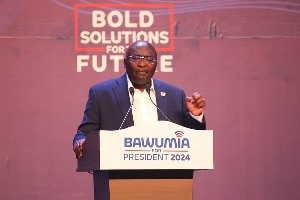The New Patriotic Party (NPP) flagbearer, Dr. Mahamudu Bawumia, has disclosed that the party is focused on preparing the country for the fourth industrial revolution.
According to Dr. Bawumia, who has been at the forefront of the government’s digitalization agenda, the NPP will not be swayed by the propaganda of the opposition National Democratic Congress (NDC) in the wake of laying these structures for a smooth takeoff.
Addressing NPP supporters at the 30th anniversary of NPP-USA, he said that despite all the crises the government faced, they were still recruiting more nurses and other workers.
“The fundamental instrument for any country for the full participation of the fourth industrial revolution is digital identity, which brought about the Ghana card, with about 17.6 million citizens being registered on the Ghana card, and the unique identification of the Ghana card is helping us to deal with corruption in the area of ‘Ghost’ workers. The NPP government is focused on how to prepare Ghana for the fourth industrial revolution and therefore will not be deterred by the NDC’s propaganda," he stated.
The NPP flagbearer also revealed that the track record of the NPP is unmatched and that the NDC has nothing to show throughout its regime.
“They think we have short memories. We saw how the economic growth collapsed when they took over from President Kufour, coming down to 3.4% from over 8% that they inherited. We saw low agricultural and industrial growth and an economy that did not face crises such as COVID-19 and the Ukraine crisis, but they had to cancel teacher training allowances and nurse training allowances, and they could not think of how to implement Free Senior High School,” he explained.
Dr. Bawumia noted that despite COVID-19 and the Ukraine crisis, the NPP has done better than the NDC without any crisis.
“We have done better than the NDC when you talk about performance because we have doubled the agriculture growth rate, we have performed higher in industry growth, and when they were creating unemployment, we were creating jobs of over 2.1 million, 1.2 million jobs in the public sector, and 975,000 jobs in the private sector.”
Politics of Wednesday, 29 May 2024
Source: mynewsgh.com
We’re preparing for the fourth industrial revolution – Bawumia
Entertainment












